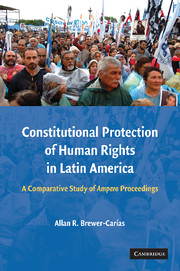 Constitutional Protection of Human Rights in Latin America
Constitutional Protection of Human Rights in Latin America Book contents
- Frontmatter
- Contents
- INTRODUCTION
- PART ONE THE CONSTITUTIONAL AND INTERNATIONAL DECLARATION OF HUMAN RIGHTS AND ITS JUDICIAL GUARANTIES
- PART TWO THE AMPARO AS A LATIN AMERICAN CONSTITUTIONAL AND INTERNATIONAL LAW INSTITUTION
- Chapter Three Judicial Review and Amparo Proceedings in Latin America
- Chapter Four The Amparo Action in Countries That Apply Only the Diffuse Method of Judicial Review of Legislation
- Chapter Five The Amparo Action in Countries that Apply Only the Concentrated Method of Judicial Review of Legislation
- Chapter Six The Amparo as a Constitutional Right in Countries with Mixed Systems of Judicial Review of Legislation
- Chapter Seven The Amparo as a Constitutional Guaranty in Countries with Mixed Systems of Judicial Review of Legislation
- Chapter Eight The American Convention on Human Rights and the Internationalization of the Amparo in Latin America
- PART THREE THE INJURED PARTY AND THE CONSTITUTIONAL RIGHTS PROTECTED BY MEANS OF THE AMPARO PROCEEDING
- PART FOUR THE INJURY, THE INJURING PARTY AND THE INJURING ACTS OR OMISSIONS IN THE AMPARO PROCEEDING
- PART FIVE THE EXTRAORDINARY CHARACTER OF THE AMPARO PROCEEDING
- CONCLUSION
- APPENDIX A List of Latin American Constitutions
- APPENDIX B List of Latin American Amparo Laws (Statutes)
- INDEX
Chapter Eight - The American Convention on Human Rights and the Internationalization of the Amparo in Latin America
Published online by Cambridge University Press: 08 August 2009
- Frontmatter
- Contents
- INTRODUCTION
- PART ONE THE CONSTITUTIONAL AND INTERNATIONAL DECLARATION OF HUMAN RIGHTS AND ITS JUDICIAL GUARANTIES
- PART TWO THE AMPARO AS A LATIN AMERICAN CONSTITUTIONAL AND INTERNATIONAL LAW INSTITUTION
- Chapter Three Judicial Review and Amparo Proceedings in Latin America
- Chapter Four The Amparo Action in Countries That Apply Only the Diffuse Method of Judicial Review of Legislation
- Chapter Five The Amparo Action in Countries that Apply Only the Concentrated Method of Judicial Review of Legislation
- Chapter Six The Amparo as a Constitutional Right in Countries with Mixed Systems of Judicial Review of Legislation
- Chapter Seven The Amparo as a Constitutional Guaranty in Countries with Mixed Systems of Judicial Review of Legislation
- Chapter Eight The American Convention on Human Rights and the Internationalization of the Amparo in Latin America
- PART THREE THE INJURED PARTY AND THE CONSTITUTIONAL RIGHTS PROTECTED BY MEANS OF THE AMPARO PROCEEDING
- PART FOUR THE INJURY, THE INJURING PARTY AND THE INJURING ACTS OR OMISSIONS IN THE AMPARO PROCEEDING
- PART FIVE THE EXTRAORDINARY CHARACTER OF THE AMPARO PROCEEDING
- CONCLUSION
- APPENDIX A List of Latin American Constitutions
- APPENDIX B List of Latin American Amparo Laws (Statutes)
- INDEX
Summary
THE INTERNATIONALIZATION OF THE AMPARO PROCEEDING
The inclusion in almost all of the Latin American constitutions of some provisions regarding the constitutional regulations of the amparo action or recourse confirms that the existence of this special judicial mean for the protection of human rights, is one of the most important features of Latin American constitutionalism, in addition to it being of Latin American origin.
Besides its constitutionalization, another feature of this institution in Latin America has been its internationalization, which explains the early incorporation for instance in the 1948 American Declaration of the Rights and Duties of Man of the Organization of American States, the first international declaration on the matter. Article 18 of such Declaration, in fact, when referring to the “right to access to justice,” set forth that:
Article XVIII. Every person may resort to the courts to ensure respect for his legal rights. A simple and brief procedure should be available for the courts to protect every person (que lo ampare) against acts of authority that, to his prejudice, violate any of the fundamental rights constitutionally enshrined.
A similar regulation was later incorporated in Article 8 of the Universal Declaration of Human Rights adopted by the United Nations in December the same year 1948, in which the right to an effective recourse before the national competent courts is guaranteed to every person for his protection (que la ampare) against acts that violate his fundamental rights recognized in the Constitution and in statutes.
- Type
- Chapter
- Information
- Constitutional Protection of Human Rights in Latin AmericaA Comparative Study of Amparo Proceedings, pp. 163 - 178Publisher: Cambridge University PressPrint publication year: 2008


